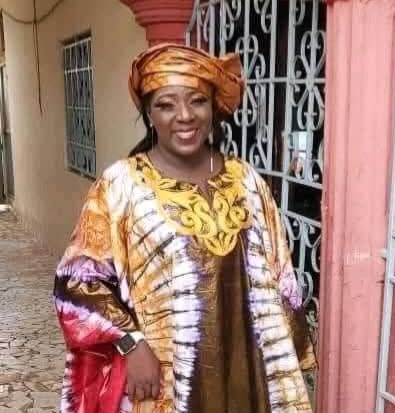In the rich tapestry of Gambian history, certain names resonate with profound significance, symbolizing sacrifice and the unyielding power of resilience. One such name is Fatoumatta Jawara—an extraordinary young woman who stood audaciously when others hesitated, a voice that shattered the oppressive silence of tyranny.
In a time when fear gripped the hearts of many, Fatoumatta emerged as a beacon of courage, defiantly challenging not only a brutal dictatorship but also the societal norms that sought to limit her.
Her story transcends mere struggle; it stands as a testament to the transformative power of conviction and the indomitable spirit of those who dare to envision a future of freedom. Fatoumatta Jawara’s life is a clarion call for action. She teaches us that tyranny flourishes not only through the actions of the oppressor but also through the complicity of the oppressed. Her journey exemplifies unwavering determination, laser-like focus, and unbridled fearlessness, inspiring a new generation of Gambians—especially women—to seize the mantle of the fight for justice and equality.
As Wole Soyinka wisely stated, “The greatest threat to freedom is the absence of criticism.” Fatoumatta Jawara’s life and legacy serve as powerful rebukes to silence, complacency, and inaction. She has shown us that when one woman rises against injustice, she ignites a flame that compels a nation to follow. For her sacrifices, her bravery, and her relentless pursuit of freedom, Fatoumatta Jawara will forever shine as a beacon of hope and resilience for generations to come. Fatoumatta Jawara was more than just a youth politician or a pro-democracy activist; she represented audacity, courage, and unyielding determination in the face of tyranny.
At a time when many Gambians, including men, faltered in the face of Yahya Jammeh’s oppressive regime, Fatoumatta stood resolute. She joined the ranks of fearless pro-democracy activists, demanding electoral reform and justice, fully aware of the life-threatening risks that lay ahead. Her journey was anything but easy; it was fraught with unimaginable suffering and profound sacrifice. Alongside her courageous colleagues, Fatoumatta boldly protested against a regime that thrived on fear and repression. Their leader, Ebrima Solo Sandeng, paid the ultimate price when he succumbed to brutal torture that claimed his life.
Fatoumatta and her fellow activists, too, endured horrific abuses, including imprisonment and sexual violence, yet their spirits remained unbroken, resolute in their fight for justice. Fatoumatta’s sacrifice, along with that of her comrades, became the very seed of freedom for The Gambia. Their bravery ignited a movement that dismantled the chains of dictatorship, and it is because of their unwavering courage that Gambians today breathe the liberating air of freedom and democracy.
Her story serves as a powerful testament to the strength of resilience and the unyielding human spirit. Fatoumatta Jawara’s legacy is not merely one of suffering and struggle but a beacon of hope and triumph. She exemplifies how true transformation often demands extraordinary courage, and it is the bravery of individuals like her that paves the way for a brighter future. Fatoumatta Jawara embodies defiance—defiance against oppression, silence, and the restrictive expectations of a patriarchal society.
During the harrowing years of Yahya Jammeh’s tyranny, many Gambian men, even those in influential positions, succumbed to a suffocating silence. In stark contrast, Fatoumatta chose to act. Her story, like that of countless young female activists throughout history, radiates courage that illuminates the inaction of others. As Wole Soyinka powerfully articulated in his timeless work, The Man Died, “The man dies in all who keep silent in the face of tyranny.”
In The Gambia, it was not just men who were silenced by fear; entire institutions and communities were paralyzed by oppressive inertia. Yet, young women like Fatoumatta shattered that silence, wielding their courage as both a shield and a sword. They bravely spoke out when others stood by, challenging not only the dictator’s iron-fisted rule but also the deeply entrenched societal norms that sought to suppress their voices.
Fatoumatta Jawara redefined the image of an African freedom fighter. Unlike iconic figures such as Winnie Mandela and Rosa Parks, whose legacies were already solidified, Fatoumatta emerged as a fearless young woman and opposition politician in The Gambia, steadfastly opposing tyranny. During Yahya Jammeh’s oppressive regime, she took a courageous stand when few men—and even fewer women—dared to confront the status quo. Her battle centered on The Gambia’s electoral laws—unjust legislation deliberately designed to entrench oppression and sustain Jammeh’s iron grip on power following his coup in 1994.
When presidential candidacy fees skyrocketed from 10,000 Gambian dalasi (about $161 or £132) to an astonishing 500,000 dalasi (around $8,050), Fatoumatta, along with protest leader Ebrima Solo Sandeng and other activists, ignited a powerful movement demanding electoral reform. Their bravery came at a devastating cost: Sandeng was brutally tortured to death, while Fatoumatta and her comrades endured rape, torture, and imprisonment.
Yet, their sacrifices—etched in blood, sweat, and tears—became the driving force behind The Gambia’s eventual liberation. Her journey is a reflection of the struggles faced by other fearless women around the world. One cannot help but think of Liberia’s Leymah Gbowee, who united women to bring peace during the civil war, or South Africa’s Ruth First, who bravely fought against apartheid. These women, like Fatoumatta, understood that complacency in the face of injustice is tantamount to complicity. Their sacrifices transcend borders, resonating as powerful calls for freedom and equality.
Fatoumatta’s activism was marked by profound personal sacrifice. On April 14, 2016, she and her fellow activists boldly confronted the oppressive Jammeh regime during a pivotal peaceful protest, demanding justice and systemic reform. While heroic figures like Solo Sandeng, Solo Koroma, Lang Marong, Fatoumatta Camara, and Nogoi Njie are rightly celebrated for their contributions, Fatoumatta’s fearless declaration of “enough is enough” deserves equal recognition. That fateful day ignited a movement for national freedom, ultimately leading to Jammeh’s defeat on December 1.
The collective silence of men, the apathy of society, and the complicity of institutions underscored the critical importance of her voice. Fatoumatta shattered the illusion that Gambian women were mere spectators in the political arena; she emerged not only as a participant but as a transformative leader. Her actions proved that young women could be the architects of liberation even in the face of widespread inaction.
Fatoumatta’s journey towards liberation was riddled with unimaginable suffering. She endured months of brutal detention in Mile II and Janjangbureh prisons, facing severe charges that sought to silence her. Her testimony laid bare the harrowing conditions of her imprisonment: isolation, denial of medical care, and severed ties with her family. Yet, her resolve remained unbroken. On December 8, 2019, she regained her freedom through a presidential pardon—a bittersweet victory after enduring unimaginable injustice.
Today, Fatoumatta’s legacy stands as an enduring symbol of courage and an urgent call to action. She reminds us that tyranny thrives not only through the actions of oppressors but also through the complacency of the oppressed. Her journey exemplifies unwavering determination, resilience, and courage, inspiring young Gambians—especially women—to continue the relentless pursuit of justice and equality.
As we honor Fatoumatta Jawara, let us fully embrace the lessons her life teaches us. We must strive to protect the freedoms she fought so valiantly for, ensuring that her sacrifices were not made in vain. Her name will forever be etched in the annals of Gambian history as a beacon of bravery, a symbol of resistance, and a champion of democracy.
Fatoumatta Jawara’s activism parallels the spirit of global icons like Malala Yousafzai, who defied violence to advocate for girls’ education, and Tawakkol Karman, the Yemeni activist whose dedication earned her the Nobel Peace Prize. These extraordinary women, like Fatoumatta, understood that inaction in the face of injustice is tantamount to complicity. Their sacrifices resonate across borders, serving as powerful clarion calls for freedom and equality. Beyond her remarkable political achievements, Fatoumatta’s profound humanity shines through.
As a devoted wife and mother, she adeptly balances her responsibilities with grace and humility. Her deep empathy for others, forged in the crucible of her own suffering, fuels her unwavering commitment to societal progress. She is not just a politician or an activist; she embodies resilience and hope for all Gambians.
“Still I rise”she seemed to say,
A warrior against the tides of fear,
Her voice—unyielding, clear—
A guide for generations yet to come.
Fatoumatta Jawara’s life is not merely a narrative of struggle; it is a powerful and urgent call to action. She illuminates the stark reality that tyranny flourishes not only through the bold actions of oppressors but also through the troubling silence of the oppressed. Her remarkable journey epitomizes determination, focus, and fearlessness, inspiring young Gambians—especially women—to persist in the fight for justice and equality. The gravest threat to freedom lies in the absence of criticism.
Fatoumatta Jawara’s life and legacy stand as potent rebukes to silence, complacency, and inaction. She has shown us that when one woman boldly confronts injustice, she has the power to galvanize an entire nation. For her sacrifices, courage, and steadfast belief in freedom, Fatoumatta Jawara will forever shine as a beacon of hope and resilience for generations to come.
Fatoumatta Jawara shattered the conventional image of an African freedom fighter. Unlike iconic figures such as Winnie Mandela and Rosa Parks, whose contributions are well entrenched in history, Fatoumatta emerged as a fearless young woman and opposition politician in The Gambia, standing firmly against tyranny. During Yahya Jammeh’s oppressive regime, she dared to challenge the status quo when few men—and even fewer women—would. Her story is one of extraordinary resilience and triumph in the face of overwhelming odds.

Today, she represents hope and determination, inspiring countless Gambians. Her election as a Member of the National Assembly for Talinding Kunjang in April 2017 stands as a powerful testament to her unwavering commitment to justice and democracy. Within the National Assembly, she plays an active role in the Standing Committees on Defence and Security and the Select Committees on Health and Regional Governments, tirelessly advocating for a brighter future for The Gambia.
As a dedicated supporter of her former political party, the United Democratic Party (UDP), Fatoumatta’s journey has been characterized by relentless persecution. On July 14, 2016, she was arrested for courageously protesting in favor of electoral reforms. Despite her critical role in the demonstration, she was not initially charged under the Public Order Act; instead, she disappeared from public view, held incommunicado while her family remained in anguish over her fate.
Her journey was marked by profound personal sacrifice. Fatoumatta endured eight harrowing months in custody, finally regaining her freedom on December 8, 2019, through a presidential pardon after Adama Barrow’s election. During her imprisonment, she faced brutal conditions. Her testimony exposed the torment she experienced at the National Intelligence Agency (NIA) headquarters and Mile II prison, where she was denied medical attention and access to her loved ones. Yet, against all odds, Fatoumatta emerged stronger, embodying determination, focus, and fearlessness. As a devoted wife and mother, she exemplifies hard work, humility, and an unwavering commitment to progress.
Fatoumatta Jawara’s story serves as a poignant reminder that the struggle for freedom often demands extraordinary sacrifices. Fatoumatta Jawara will always be celebrated as a gallant freedom fighter who made profound sacrifices for The Gambia’s liberation from tyranny. Her journey inspires not only Gambians but especially young women, affirming that both men and women have vital roles in the quest for national liberation. As we honor her legacy, let us fervently strive to protect the freedoms she so valiantly fought for and ensure that her sacrifices resonate through time.





